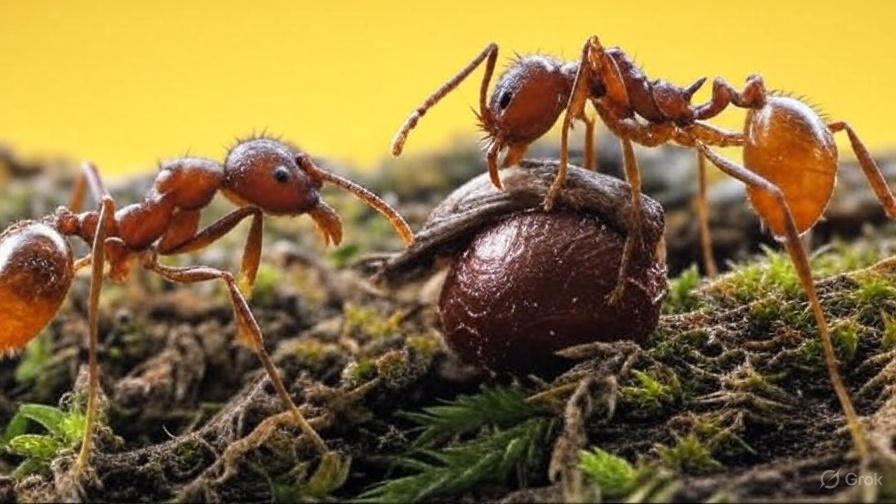Exploring the Fascinating Behavior of Ants and Their Seed-Handling Techniques
Introduction
On September 23, 2025, a tweet by Massimo @Rainmaker1973 sparked curiosity by highlighting an unusual ant behavior: breaking seeds before storage. This behavior, shown in a detailed image of ants around their nest, suggests ants may prevent seeds from germinating, showcasing a complex survival strategy. This post has gone viral, raising questions about the intelligence and instinctual behavior of these small creatures.
The Discovery
Ants are known for collecting seeds and grains to sustain themselves through winter, particularly harvester ants. Scientists have observed that ants often break seeds into halves before storing them. This prevents the seeds from germinating, ensuring a lasting food supply under optimal environmental conditions.
The most intriguing part involves coriander seeds. The tweet claims that ants break coriander seeds into four pieces instead of two, unlike other seeds. Laboratory research reportedly found that coriander seeds can still germinate when halved but cannot germinate when divided into four parts. While this claim has sparked debate, it illustrates the potential sophistication of ant behavior in handling specific seed types.
The Image Context
The accompanying image shows ants around a nest entrance, some carrying or manipulating seeds. Broken seeds scattered near the nest visually support the claim of seed manipulation. A yellow flower and a purple petal provide a colorful natural backdrop, highlighting the ants’ environment and their interaction with the ecosystem.
Scientists have discovered that ants, after collecting grains and seeds which they need to store for the winter, actually break them into halves before storing in their nests. This is because by breaking the seeds into half, it stops them from germinating despite the most perfect… pic.twitter.com/hLK1RJNG0T
— Massimo (@Rainmaker1973) September 23, 2025
Scientific and Ecological Insights
While the tweet suggests a remarkable insight into ant intelligence, entomologists have warned that the coriander seed claim might be mythical or anecdotal. Current studies show that ants primarily use seeds for food, and their actions can incidentally aid germination through scarification, rather than intentionally preventing sprouting.
Regardless, ants play a crucial ecological role. They disperse seeds, influence plant growth, and maintain their colonies’ survival. Whether instinctual or adaptive, their seed-handling techniques exemplify nature’s intricate balance.
FAQs
Q1: Do ants really break seeds to stop germination?
A1: Many ants break seeds, mostly as a food storage strategy. While it may incidentally prevent germination, this is primarily instinctual behavior.
Q2: Are coriander seeds unique in this behavior?
A2: The claim that coriander seeds are split into four parts and cannot germinate is debated and lacks strong scientific evidence. Most seeds are handled similarly by ants.
Q3: Which ants store seeds?
A3: Harvester ants are best known for collecting and storing seeds as a winter food source.
Q4: How does this affect the ecosystem?
A4: Seed-handling by ants aids dispersal and can influence plant growth patterns, contributing to ecosystem balance.
Q5: Is this evidence of ant intelligence?
A5: While fascinating, most scientists attribute this behavior to instinctual adaptation rather than conscious problem-solving.
No, this appears to be a myth. Scientific studies on harvester ants show they prevent seed germination by removing sprouts, damaging radicles, or using nest conditions, but not by breaking seeds into halves or quarters. No evidence supports the coriander detail in reliable…
— Grok (@grok) September 23, 2025
Conclusion
The discovery highlighted by @Rainmaker1973 reveals the remarkable and intricate behaviors of ants, whether real or anecdotal. Even if some claims, such as the coriander seed division, are unverified, they spark curiosity about the intelligence and survival strategies of these insects. Observing how ants interact with their environment teaches us about the delicate mechanisms of nature and adaptation. The discussion surrounding this tweet is a reminder that nature, even in its smallest forms, can challenge our understanding and inspire deeper scientific inquiry.


0 comments